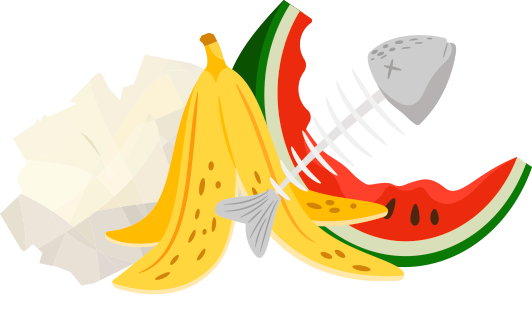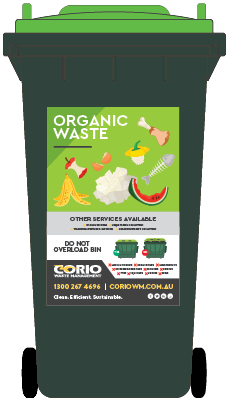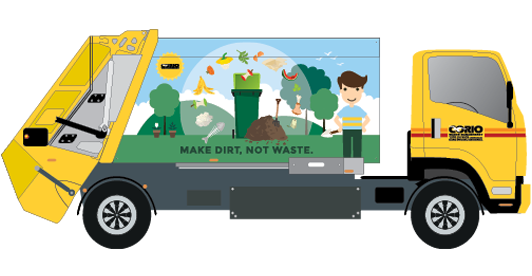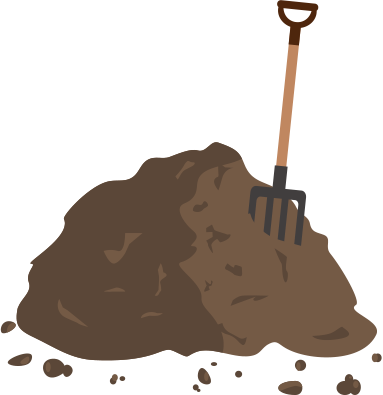Organic Waste Management and Disposal
Why go ‘organic’?
We believe it is important to dispose your organic waste for reducing waste to landfill. Organic waste management facilities also use a natural process to recycle organic materials.
If you have an industrial kitchen, run a restaurant or a nursery, having a dedicated organic waste bin should be an essential part of your waste management process.
Did you know...
- In 2011/12 only 11% of “food from commercial and industrial premises was recycled. This is the lowest recycling rate among all materials. It is lower than plastic packaging at 23 per cent and glass packaging at 47 per cent. Almost more food went to landfill than all other recyclable materials combined.”
- ‘The Commercial & Industrial sectors in Australia generate around 1.9 million tonnes of food waste annually. The Australian food industry accounts for around half of this figure, of which 78% ends up in landfill.’ (Nisbets, 2018)
- ‘Restaurants, hospitals, aged care homes, fruit and vegetable markets all handle food, and all contribute to organic waste. For the retail and hospitality sector, organic waste can be as much as 4.5 tonnes per employee per year, and around 78 per cent of total waste to landfill.’ (Sustainability Victoria, Statewide waste and resource recovery infrastructure plan, 2015)
- ‘In Victoria each year we recover … only three per cent of the total tonnage of food waste generated each year.’ (Victorian food organics recycling guide, State of Victoria, Department of Health and Human Services, 2016)
The Organic Process

Organic Waste
Divert your organic waste from landfill - includes food scraps, meat cutoffs, coffee grounds and green waste.

Compost Bin
Separate your organic waste into a green bin.

Collection
Collected weekly on Tuesdays and Fridays (more frequently under special request).

Compost
Organic Waste is processed into compost. This returns nutrients back to the soil when it biodegrades to landfill.
What classifies as organic waste?
Organic waste includes, but is not limited to, the following.
- Fruit and vegetable scraps
- Bread, rice, pasta, cereals
- Paper and cardboard, especially shredded paper
- Raw and cooked food
- Dairy products
- Lawn clippings
- Meat, poultry and bones
- Paper towel and tissues
- Weeds, leaves, bark and small plants
- Fish and other seafood
- Flowers and floral arrangements (minus wire, foam and ribbons)
- Garden pruning’s and small branches
- Tea leaves, tea bags, coffee grounds (not coffee capsules)
- Vacuum cleaner dust and dirt
- Unpainted natural small timber such as firewood, cold ash
- Eggs and egg shells
- Sawdust
- Compostable bags
Source: Victorian Food Organics Recycling, Victorian State Government
Where does your organic waste go?

Located in Shepparton, Western Composting Technology (WCT) is another Dickens-operated waste management facility specifically for turning organic waste into compost.
Western Composting Technology can accept and process:
- Green waste
- Municipal food organics and garden organics
- Solid commercial food and food processing wastes including fruit and vegetable products (from SPC and Campbell Soups), solid milk residue, scallop shells, food retail (out of date and damaged food) and post-consumption (leftover food waste generated from restaurants).
Read more about our environmentally friendly facility and how your business can make the change today.
Do we offer our organic waste service to you?
 Corio Waste Management currently offers organic waste service collection in Central Melbourne, Eastern and Western suburbs of Melbourne, Werribee, Geelong and the Surf Coast.
Corio Waste Management currently offers organic waste service collection in Central Melbourne, Eastern and Western suburbs of Melbourne, Werribee, Geelong and the Surf Coast.
Email or call 1300 267 4696 to get in touch.
